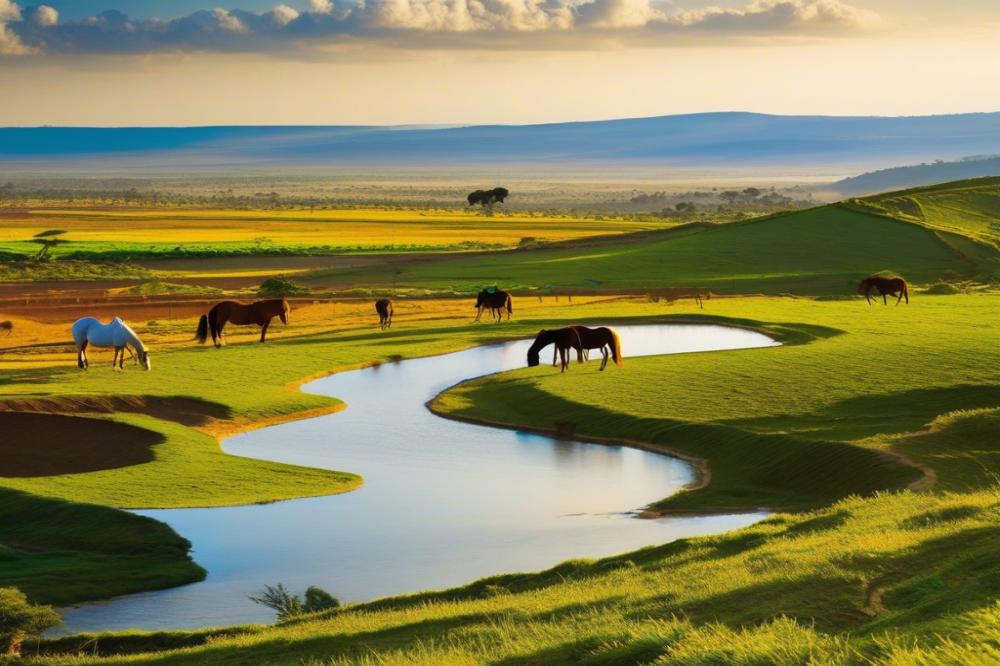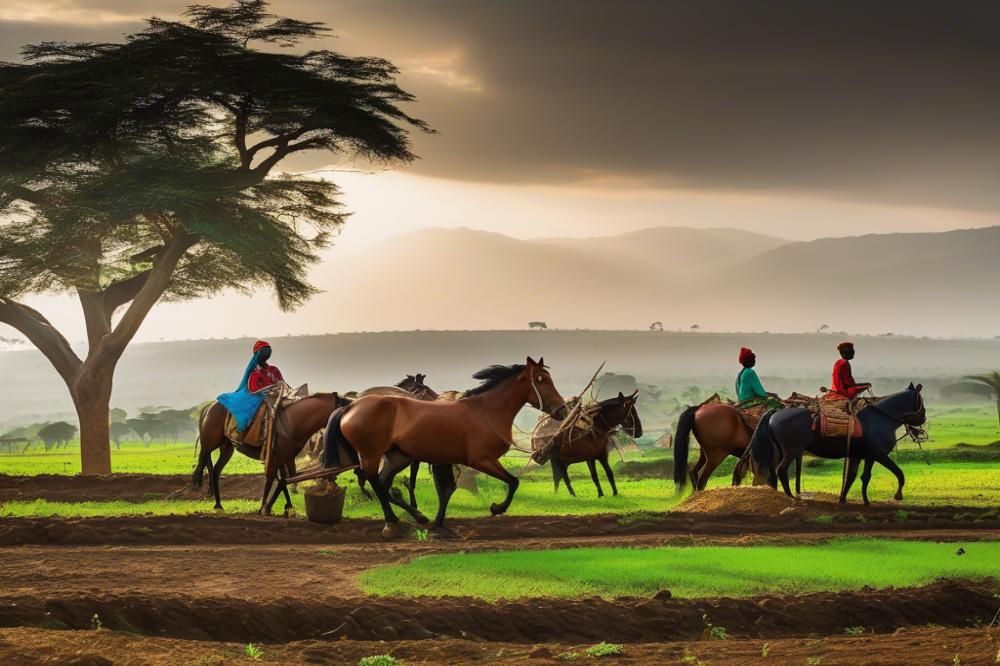Exploring Ethiopia’s Equine Heritage
Ethiopia’s landscape is home to around 1.6 million horses. These animals are not just part of the scenery; they play important roles in everyday life. Horses support farmers in their agricultural endeavors and serve as means of transport in rural areas. Their presence reflects the rich cultural tapestry of Ethiopia.
The significance of these animals goes beyond utility. In many communities, horses help weave social connections, join family gatherings, and assist in local traditions. Farmers rely on their strength to plow fields, carrying heavy loads, or even herding livestock. Many families depend on these animals for their daily livelihood.
Within the larger context of livestock, horses occupy a special place. Ethiopia’s livestock landscape features various species, yet horses hold unique significance for many rural populations. Their contributions extend to cultural practices and historical significance as well. It becomes clear that horses are integral in both agriculture and social life, enriching the lives of countless Ethiopians. Understanding their role offers insight into a vibrant and dynamic landscape.
Ethiopia horses: Their Role in agriculture

In Ethiopia, horses hold a vital position in farming practices. These animals are not just companions; they are essential for hard work on the land. Many farmers rely on horses for plowing fields, which helps prepare the soil for planting. When it comes to moving goods, horses have been a transportation staple for generations.
Using horses as work animals has a deep-rooted tradition in many Ethiopian communities. Farmers often harness them to pull plows through tough terrain. This labor is not only efficient but also reduces strain on farmers, allowing them to manage larger plots of land. Furthermore, these animals contribute to the transportation of harvested crops to markets, ensuring farmers can sell their produce without unnecessary delays.
The impact of horses on crop production is clear. Their ability to work in the fields leads to better yields. With the help of horses, farmers can cultivate expansive areas of land that would be hard to manage otherwise. This process encourages sustainable practices by allowing farmers to maintain soil health while increasing productivity.
A vital aspect of rural life, horses also provide a source of income for many families. The sale of horse-assisted services, such as plowing and transportation, can improve a household’s financial stability. Livestock, including horses, plays a significant role in ensuring food security for communities in Ethiopia. The importance of maintaining healthy animal practices can’t be understated, as it directly influences agricultural output.
In addition, the presence of horses promotes a sense of community. Neighbors often come together to help each other with farm work, with horses at the center of these activities. This collaboration strengthens social bonds and fosters a spirit of cooperation among farmers.
The Cultural Significance of Horses

Horses in Ethiopian Culture and Tradition
Horses have a deep-rooted place in Ethiopian society. Many communities view these animals as more than just a means of transportation. They symbolize strength, beauty, and resilience. Across regions, horses are involved in various cultural practices. Special ceremonies often feature them prominently. Families take pride in their horses, showcasing them during important festivals. The connection between people and horses is palpable, enriching the local customs and traditions.
Equestrian Practices and Festivals
Various festivals across Ethiopia celebrate the bond between humans and horses. Events such as the Meskel Festival highlight these majestic animals. Riders don colorful garments, adding vibrancy to the festivities. Racing is another popular pastime, where skilled jockeys ride at impressive speeds. However, competitions are not just about speed. They also reflect the close relationship that people share with their animals. equestrian practices often include traditional training methods passed down through generations. Each practice holds significance, emphasizing the importance of horsemanship in the culture.
Symbolism and Status Linked to Horse Ownership
Horse ownership carries significant meaning in Ethiopian society. A well-bred horse can signify wealth and social status. It distinguishes families and individuals within communities. People often associate horses with nobility and honor. The quality of a horse can bring respect and admiration. In many villages, owning a horse is a point of pride. Conversations often revolve around the best breeds and training methods. Horses are not only tools for work but also status symbols tightly woven into the fabric of life.
Economic Aspects of Horse-Related Activities
Horses in the Rural Economy
In rural Ethiopia, horses play a vital role in daily life. Farmers use these animals for plowing fields and transporting goods. When the rainy season arrives, horses help with the heavy work of tilling land. Communities often rely on their strength and endurance to manage farm tasks more efficiently. Many households depend on horses not just for farming, but also for daily chores and local transportation.
Contribution to Livelihoods and Income Generation
Equines serve as important assets in the lives of many families. Owning a horse can significantly affect a household’s financial situation. In terms of labor, these animals can increase productivity. Additionally, they offer a source of income through services such as transportation and hauling. Farmers often sell excess produce in local markets using horses for transport. This can lead to better sales and increased earnings.
Role of Horse Trade and Commerce
A bustling market exists for horse trading in many regions. People sometimes buy or sell horses for various reasons, including breeding or replacing aging animals. This trade provides opportunities for many local businesses. Owners may also seek veterinary services and supplies for their horses, further stimulating local economies. The horse trade not only influences livelihoods, but also forms a notable part of cultural exchanges in communities. Such commerce injects money into the economy and creates jobs linked to animal care and maintenance.
Horses in Daily Life and Rural Communities
Integration of horses into daily routines
Horses play a vital role in daily routines across rural areas of Ethiopia. Many families integrate these animals into their everyday tasks. They are not just tools, but companions in life. They help with farm work, transportation, and even make chores feel less daunting. Early mornings often find horses being fed and groomed. This care builds a bond between human and animal, making each day more fulfilling.
Transportation of goods and people
When it comes to moving goods, horses are indispensable. They carry heavy loads of produce to markets, ensuring local economies thrive. Villagers also use them to transport family members for various purposes. Whether it’s traveling to a nearby town or taking children to school, horses provide reliable mobility. The roads may not always be accessible by vehicles, but these animals know the terrain well. They navigate the uneven paths, making journeys easier for everyone involved.
Role in family and community structures
In many communities, horses symbolize strength and prosperity. Families often rely on these animals for financial stability. An equestrian can also reflect one’s status within the community. Thus, owning a horse can elevate a family’s reputation. Shared activities, such as horseback riding or participating in local festivals, foster strong bonds among neighbors. This brings people together in a way that is both enjoyable and meaningful. Cooperation is essential, whether for training horses or participating in communal events. Horses facilitate connection and support among families, enriching the social fabric of rural life.
Animal Husbandry Practices for Ethiopian Horses
Techniques of horse breeding and care
Horse breeding in Ethiopia is often a family tradition. Many farmers choose stallions with good health and strong lineage. Care involves regular feeding and grooming to keep them healthy. Pastures should include a mix of grasses and legumes. Proper vaccinations also play a key role in their well-being. Raising horses is a significant investment, requiring attention and dedication. Farmers often participate in breeding programs to improve traits. Knowledge about genetics can lead to better offspring.
Challenges faced in horse management
Managing horses comes with various challenges. There is a shortage of veterinary services in rural areas. Farmers often struggle to find qualified help when their horses are ill. Additionally, climate change affects grazing patterns. Drought can lead to insufficient food, impacting health. Infrastructure like roads can hinder transportation for care. Some horses face overwork, affecting their productivity and condition. Limited access to proper breeding techniques can also pose issues.
Sustainable practices in equestrian life
Sustainability in horse management is becoming more important. Many communities now focus on organic feeds and natural pasture rotations. Reducing chemical use in agriculture helps keep the environment clean. Traditional methods of herding can minimize stress for the animals. Farmers are also learning to share resources, fostering a sense of community. Collaboration on breeding can lead to stronger genetic lines. Furthermore, education on horse welfare is essential for better practices. Awareness of local ecosystems can guide sustainable decisions.
Final Thoughts on the Role of Horses in Ethiopia
Horses play a vital role in Ethiopia, impacting various aspects of daily life. These animals contribute significantly to agriculture, serving as reliable livestock for transportation and tilling the land. Farmers often rely on them to carry goods, making trade more efficient. Their strength and endurance are essential during harvest season when extra help is needed.
Culturally, equestrian traditions are deeply ingrained in many Ethiopian communities. Celebrations often feature horse racing and parades, showcasing the beauty and skill of both rider and horse. These moments create a sense of unity and pride among the people. Horses are not just animals; they are companions that connect families to their heritage and land.
Looking ahead, the future of horse populations in Ethiopia depends on sustainable management practices. Conservation efforts must focus on providing better care and ensuring the health of these animals. Education about responsible ownership can help maintain strong horse communities. Balancing tradition with modern needs will be key. As the world changes, finding ways to adapt while preserving equestrian practices will be crucial for both farmers and families alike.
In summary, horses are foundational to Ethiopia, supporting its agriculture and enhancing its rich cultural tapestry. Their presence nourishes the economy and strengthens social bonds. By focusing on their welfare and proper management, Ethiopia can safeguard this important resource for future generations.



